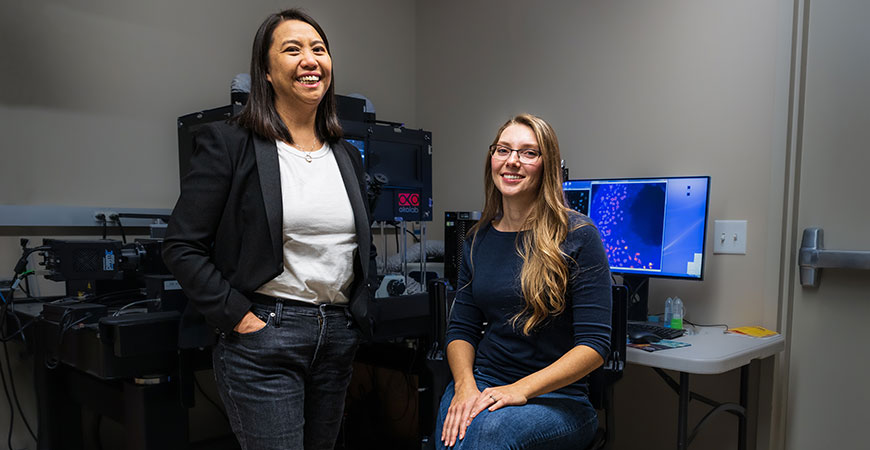
The National Science Foundation (NSF) has given Professor Stephanie Woo the CAREER award to help her delve into congenital birth defects by looking at the embryonic cells of zebrafish.
Woo is the 32nd researcher from UC Merced to earn a CAREER award.
CAREER awards are among the NSF’s most prestigious awards. They are given through the Faculty Early Career Development Program to recognize untenured faculty members as teacher-scholars. Early career faculty members are selected based on three factors: the strength of their research proposals; their potential to serve as academic role models in research and education; and their leadership in their fields and organizations.
The NSF Division of Integrative Organismal Systems awarded Woo $1 million over the next five years for the project “Contact Inhibition of Locomotion as a Positioning Mechanism During Endoderm Morphogenesis.”
The project will focus on how a population of embryonic cells called endodermal cells work together to build a tissue that will eventually become parts of the gastrointestinal and respiratory systems.
In humans, endoderm-derived congenital malformations affect an estimated 10 per 10,000 births.
“Zebrafish are vertebrate animals, just like humans. They have all the same major organ systems as humans. Genetically, zebrafish are more than 70% similar to human, and over 84% of disease-associated human genes are also found in zebrafish. So, in general, any studies using zebrafish are very likely to be applicable to humans,” Woo explained.
Zebrafish are good models for this study because their embryos are transparent and develop externally (outside the mother), making it easy to image cellular interactions within a living, intact organism.
Woo and her lab study cell and developmental biology to understand how cells work together to build tissues and organs. The researchers’ preliminary work suggested that, counterintuitively, zebrafish endodermal cells disperse then come back together to form a tissue. The study aims to understand how and why endodermal cells undergo these two different behaviors — dispersal and convergence.
The decision between dispersing or converging is a fundamental one that arguably every cell on Earth needs to make. Being able to switch from dispersal to convergence movements, and vice versa, is required for everything from tissue formation in an embryo and the way slime mold reproduces to wound healing and cancer metastasis, Woo said. The zebrafish endoderm happens to be a good system to study how cells make this dispersal/convergence decision because it's easy to experimentally manipulate and observe.
“We do not actually know if human endodermal cells undergo the same process of dispersal and convergence, but similar processes occur in mouse and chick embryos, so it's very likely true for humans too,” Woo said. “It's nearly impossible to study this stage of endoderm development in humans because it occurs before implantation. So, being able to use model organisms is particularly important in this case.”
Woo said she and her students are excited about this project because it suggests cells are capable of building complex patterns using relatively simple rules.
“By understanding how cells are coordinated during tissue formation, our research also has implications for tissue engineering, wound healing and cancer progression,” she said.
Woo has been with UC Merced since she joined the Department of Molecular and Cell Biology in 2017. She is affiliated with the Health Sciences Research Institute and the CREST-Center for Cellular and Biomolecular Machines .
“I am thrilled for Professor Woo’s NSF CAREER award — it is a well-deserved honor to her work and a testament to her scientific creativity and approaches, and her innovative contributions to our curriculum,” said Professor Jennifer Manilay , department chair.
Each CAREER award proposal includes an educational outreach component, and Woo said her project will be integrated with an education and outreach program designed to expand access to authentic research experiences and enhance science, technology, engineering and math (STEM) education for undergraduate students and the general public. She plans a course-based undergraduate research experience (CURE) for UC Merced students; a summer program that will give undergraduate students direct experience working on an independent project in a research lab; and an educational exhibit on developmental biology and microscopy for a local children’s museum designed in partnership with teachers in training in the CalTeach program.
Manilay pointed out that in 2021, Woo participated in the UC Merced Course Redesign Initiative, which provided support to faculty in implementing evidence-based strategies to create compelling learning environments for students.
“With this and support from the UC Merced HHMI Inclusive Excellence in Science Education, Professor Woo developed and piloted a CURE course involving gene editing techniques that are closely integrated with her research program,” Manilay said.
Undergraduates will earn credits toward their majors as they participate in the CURE, making faculty-led research accessible to more students who might not have been able to participate if it required an extra time commitment.
“Also, many more students can be accommodated in a CURE compared to a traditional faculty-run lab,” Woo wrote in her proposal. “CUREs have been demonstrated to improve scientific literacy and critical thinking skills and persistence in STEM fields, especially among underrepresented minorities.”
Students will also be able to explore STEM careers through guest lectures and an on-site visit to a collaborator’s lab at the Chan Zuckerberg Biohub, a Bay Area-research facility that partners with universities to address curing, preventing or managing diseases.
“We are very excited that this award will increase access to authentic research experiences for undergraduate students at UC Merced,” Woo said, “and we are also looking forward to sharing our research with the larger Merced community through the exhibit we will design for the Kids Discovery Station (a children's museum in Merced).”
Woo was honored to learn she had been given the CAREER award.
“Because the CAREER award includes both research and education components, winning this award is a meaningful acknowledgement of my work as both a scientist and an educator,” she said.



